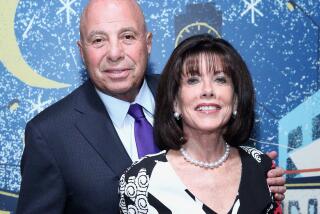Robert Heilbroner, 85; Economics Texts Were Praised for Lively Writing Style
- Share via
Robert Heilbroner, an educator and prolific writer who enlivened the subject of economics with his classic study of the world’s most influential economic thinkers, has died. He was 85.
Heilbroner died Wednesday in New York City of a stroke. He had suffered from Lewy body disease, which causes dementia similar to Alzheimer’s disease.
“The Worldly Philosophers: The Lives, Times and Ideas of the Great Economic Thinkers,” first published in 1953, became Heilbroner’s most noted work.
The best-selling book was translated into about 20 languages, sold more than 4 million copies and has ranked for years second in usage in college and university economics courses only to Paul Samuelson’s “Economics.”
“I’ve conned millions of young people into thinking that economics is an interesting subject in tune with their social concerns,” he once said. However, students were far from his only readers.
The book, which went into its seventh printing in 1999, describes the contributions of such luminaries as Adam Smith, Thomas Malthus, David Ricardo, Karl Marx and John Maynard Keynes to the history of economic thinking.
The text also includes a historical perspective missing in stodgier economics volumes, using personal anecdotes to link the men to their social and political times and to one another.
A New Republic reviewer greeted the work more than half a century ago as “the finest book for an economic semiliterate ... that has been produced in this country for years.”
Noted economist John Kenneth Galbraith called the book “a brilliant achievement” and said Heilbroner had handled his subject “nearly to perfection.”
Heilbroner added a cautionary final chapter to the 1999 edition, cryptically titled “The End of Worldly Philosophy.”
He used the chapter to detail his dislike for the modern trend in economics that relies on mathematics and esoteric models while excluding societal factors.
“Economics will not, and should not, become a political torch that lights our way into the future,” he wrote, “but it can and should become the source of an awareness of ways by which a capitalist structure can broaden its motivations, increase its flexibility and develop its social morale.”
Describing himself as a “philosophical historian” or an “intellectual” rather than an economist, Heilbroner wrote or co-wrote more than 20 books and numerous essays.
In 1972, Heilbroner became the first Norman Thomas professor of economics at the New School of Social Research in New York. The position was named for the late Socialist Party presidential candidate.
His seminal book -- which a New School advisor observed could have served as the dissertation for the doctorate Heilbroner obtained there a decade after “Worldly Philosophers” was published -- became the springboard for nearly everything he wrote over the next half-century.
In his essays and books, Heilbroner repeatedly mulled over where the world stood in the stream of socioeconomic history, what it was like at the moment and where was it headed.
Adept at readably describing economic theories and relating them to current social and political problems including overpopulation and war, Heilbroner churned out such titles as: “The Quest for Wealth: A Study of Acquisitive Man”; “The Future as History”; “The Making of Economic Society”; “The Limits of American Capitalism”; “Is Economics Relevant?”; “Business Civilization in Decline”; “Marxism: For and Against”; “21st Century Capitalism”; and “Teachings From the Worldly Philosophy.”
Heilbroner was known as well for his gloomy forecasts of an “ecological Armageddon” in which wasteful industrial production would destroy the environment and wreak world havoc.
In “An Inquiry Into the Human Prospect,” he acknowledged that nobody wanted to sacrifice comforts for future generations or help people on the other side of the world.
Therefore, he theorized, environmental destruction could signal the end of democracy because only dictatorships or other authoritarian governments could command the sacrifices needed to repair the ecology.
“If the issue for mankind is survival,” he wrote, “such governments may be unavoidable, even necessary.”
Government functionaries and general readers, as well as generations of economics students, credit Heilbroner with turning normally eye-glazing treatises on economic theory into lively literary encounters.
Los Angeles Times reviews of his various books inevitably have included phrases such as “an elegant, riveting account of the economic system under which we live” or “a personably written account.”
Reviewers for other publications praised Heilbroner’s “essentially literary intellectual style,” his “lucid and elegant” prose or called him “a good writer ... both lively and enlightening.”
Heilbroner, with a novelist’s touch, earned particular praise for luring the reluctant into learned books with great opening lines.
In 1995’s “Visions of the Future: The Distant Past, Yesterday, Today, Tomorrow,” for example, he began: “This is an exceedingly long, short book, stretching from archaeological beginnings 150,000 years in the past to who knows how many millennia into the future.”
Born on March 24, 1919, in New York City to a wealthy clothing-merchant family, the economist ironically told a New York Post interviewer in 1972: “I was reared during the Great Depression and never knew there was one.”
He graduated summa cum laude with a bachelor’s degree in history, government and economics from Harvard in 1940 and a doctorate from the New School of Social Research in 1963.
Drafted into the Army during World War II, he served as an intelligence officer, interrogating Japanese prisoners of war in the Pacific, and earned a Bronze Star.
Heilbroner is survived by his wife, Shirley, and two sons from a previous marriage, Peter and David.
More to Read
Sign up for our Book Club newsletter
Get the latest news, events and more from the Los Angeles Times Book Club, and help us get L.A. reading and talking.
You may occasionally receive promotional content from the Los Angeles Times.







